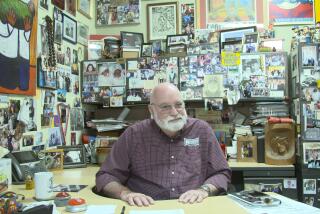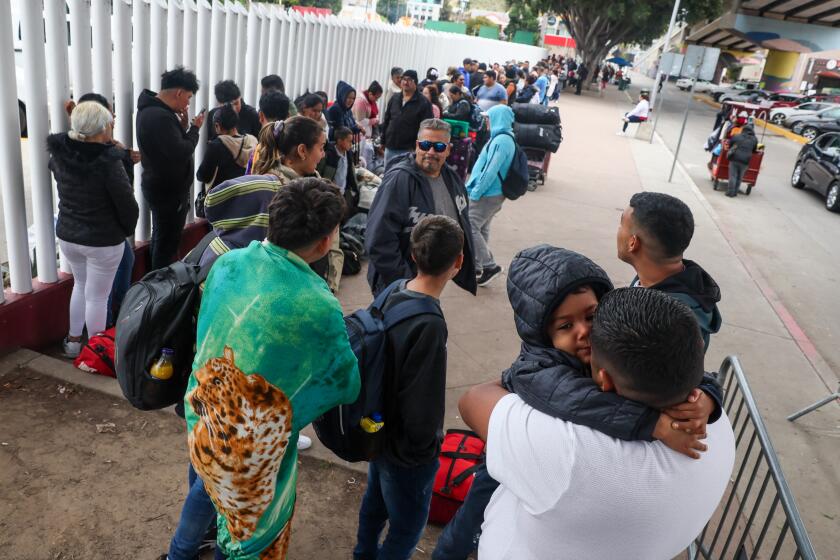Life Lessons Lead to Church Role
Salvadoran immigrant Arturo Lopez grew up too poor to acquire the university education typically required for professional lay ministers in the Roman Catholic Church.
But to his Dolores Mission Church community in Boyle Heights, his long years of walking with the people through shootings and deaths, religious festivities and peace marches offered rich evidence of his leadership credentials.
So when parish members found out earlier this year that Dolores Mission would lose another priest, thinning its clerical ranks to one, they turned to Lopez. On Sunday, they formally commissioned him to help lead the community as a pastoral assistant and hope he will serve as a model to nurture lay leaders for the fast-growing immigrant church.
In the ceremony’s symbolic high point, community representative Claudia Martinon passed a crucifix to Auxiliary Bishop Gabino Zavala, who passed it to Lopez. Then the bishop read a proclamation commissioning Lopez to serve in his new role, as the packed congregation erupted in wild applause.
“This ceremony affirms lay leadership and the skills we have,” exulted Arturo Laris, 23, a church volunteer and seventh-grade teacher at the parish school. “It’s like giving power back to the people.”
For his part, the soft-spoken Lopez, 39, pronounced himself both humbled and excited by the challenge as he thanked the congregation alongside his wife and three daughters.
In his new role, Lopez will not conduct sacramental rituals such as Mass, which is reserved for priests. But Father Michael Kennedy, Dolores Mission’s Jesuit pastor, said Sunday’s ceremony invested Lopez with the authority to take full charge of parish business in his absence, guide the various church ministries and carry out the Jesuit vision of social justice.
“There is a lot of leadership in the immigrant communities, but because of language or lack of formal education, certain opportunities haven’t been available to them,” said Zavala, who presided over the liturgy with the ceremonial staff and miter of a bishop. “We need to find ways of forming them to be viable leaders and ministers.”
In Zavala’s San Gabriel Pastoral Region of 66 parishes, he said, more than two dozen are predominantly immigrant congregations. Although lay leaders from those parishes may be quietly emerging, he said, Sunday’s ceremony marked the first time he has presided over a liturgy to formally commission an immigrant leader.
The Los Angeles Archdiocese operates a training program for professional lay ministers known as pastoral associates that requires, among other things, a master’s degree in pastoral theology or a related field. Such graduate education is also required for deacons, who are ordained ministers allowed to assume some sacramental roles, such as baptisms.
But Kennedy and others are advocating an alternative training track based on an apprenticeship, for people who lack such formal degrees.
Lopez, for instance, holds a high school graduation equivalency degree for studies completed in El Salvador. But he has spent 16 years apprenticing with Kennedy and other Jesuits, largely working with Central American refugees and homeless people at three parishes in Los Angeles.
Lopez’s commission comes at a time when the Roman Catholic Church is reemphasizing the need to empower lay leadership. The call for lay leadership has intensified in recent years, as clergy sex scandals have cast a spotlight on the shortcomings of the church’s clerical hierarchies.
On Saturday, Cardinal Roger M. Mahony signed the concluding report of a multiyear process known as a synod to reexamine pastoral priorities in the Los Angeles church. Nurturing lay leadership was a major theme. The Society of Jesus, the world’s largest religious order also known as Jesuits, also emphasized lay leadership in its convocation last month, bringing lay and ordained together to debate future priorities.
“This is the way the spirit is moving,” Kennedy said. “We keep on talking about it, but it’s time to do it.”
But Lopez’s commission is also grounded in ancient church traditions. According to Father John Coleman, a sociologist at Loyola Marymount University, bishops and other church leaders were chosen from the people and trained under apprenticeships for 1,500 years. In the mid-16th century, the Council of Trent decided to set up seminaries to give future priests more systematic academic and moral training, he said.
“Some of the apprentices were illiterate, and others were corrupt,” Coleman said, explaining the factors driving the establishment of the seminary system. “But one disadvantage is that you get people who, after they are trained, parachute into a community they don’t know anything about.”
One of Lopez’s greatest strengths, his community backers say, is his intimate knowledge of their needs obtained through hours of devotion to them.
Parish staff member Rita Chairez, for instance, remembered the special care and attention Lopez gave her niece and nephew after the death of their mother. Medina Evertina, a computer specialist at the parish school, thinks of Lopez’s ubiquitous presence: singing and strumming his guitar at peace marches, feeding the homeless men the church houses at night, always one of the first to arrive and last to leave at parish functions.
Lopez, a short, compact man with dark brown eyes and a neat goatee, said he was raised in the capital city of San Salvador, so poor that he would go for months on a diet of tortillas alone. Although his family was not devoutly religious, he said, he has felt a tug toward ministry ever since he joined a parish choir at age 10.
At age 16, he joined the youth ministry and would walk eight hours to bring the gospel and music to people in rural villages.
But Lopez said his religious activities soon caught the eye of government officials, who arrested him several times on suspicion that they were a front for anti-government organizing, a charge he denies. Eventually, he fled for Los Angeles in 1983.
Despite the community’s call for his leadership, Lopez appears determinedly humble. At a meeting last week to plan Sunday’s ceremony, Kennedy and several staff members urged him to bless the congregation after his formal commission, an act usually associated with priests. Others joked that they would give him the miter and staff of a bishop.
But Lopez shrunk back, and emphatically shook his head no.
“You thought this would be easy, huh?” Kennedy joked.
“That’s why I agreed to do it,” Lopez replied.
More to Read
Start your day right
Sign up for Essential California for news, features and recommendations from the L.A. Times and beyond in your inbox six days a week.
You may occasionally receive promotional content from the Los Angeles Times.







